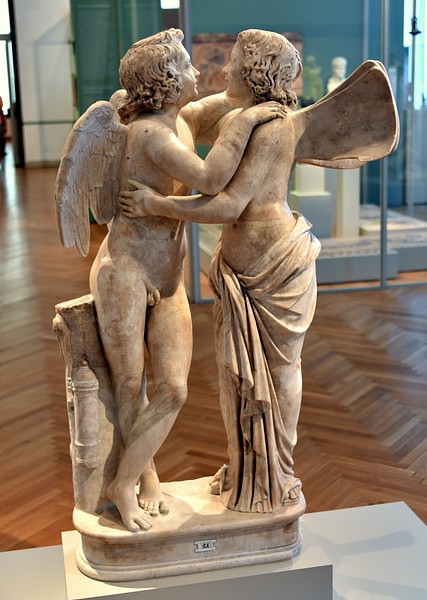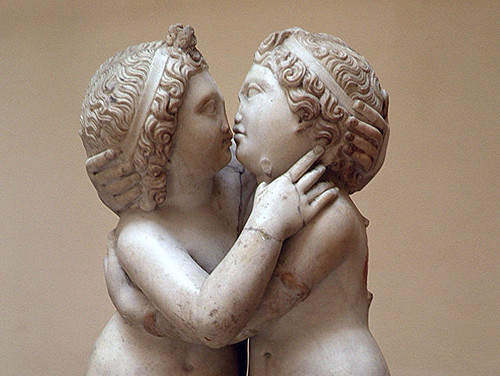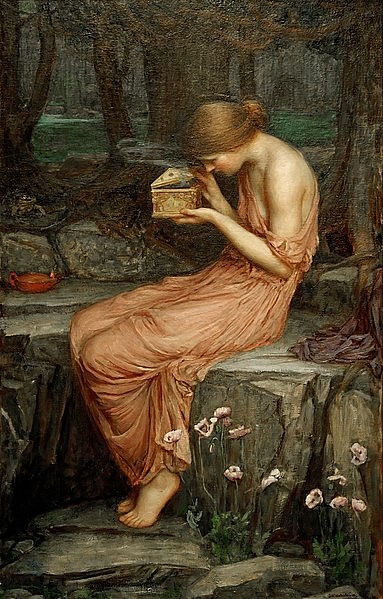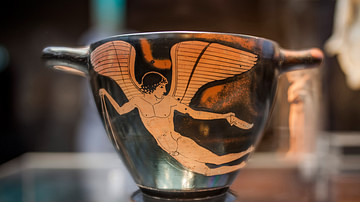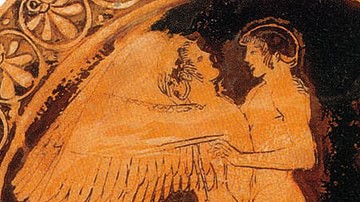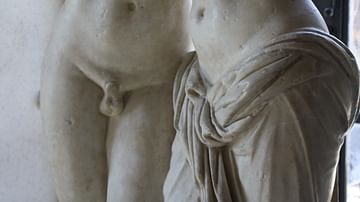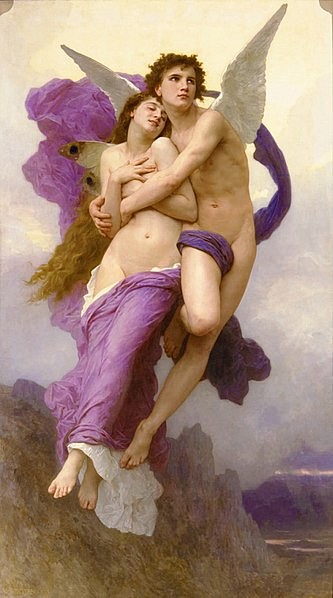
Psyche was the goddess of the soul in ancient Greek and Roman mythology. Born a mortal woman, her beauty rivaled that of Aphrodite (Venus) and inspired the love of Aphrodite's son, Eros, god of desire. After completing a series of seemingly impossible tasks to be with Eros, Psyche was granted immortality and made into a goddess herself.
Although the story of Psyche and Eros (Cupid) can be found depicted in Greek art dating back to the 4th century BCE, the most famous and complete telling of the myth is found in ancient Roman literature, in the 2nd-century CE novel Metamorphoses, or The Golden Ass, written by Apuleius.
Origins in Apuleius’ Metamorphoses
Metamorphoses is the only ancient Roman novel written in Latin to still survive in its entirety. Written in the 2nd century CE by Apuleius, a writer and philosopher from the Roman province of Numidia, the Metamorphoses, also known as The Golden Ass, consists of eleven books.
It follows the story of Lucius, a man whose desire to see and practice magic leads him to accidentally transform himself into a donkey. This sets Lucius out on his journey, during which he hears many stories. One of these is the tale of Cupid and Psyche, which is told in full. Apuleius dedicates books four through six of The Golden Ass to this tale. Although there is evidence of the story of Cupid and Psyche appearing in Greek artwork as far back as the 4th century BCE, it is through Apuleius' inclusion of the story in his novel that the details come down to modern readers and scholars.
Cupid & Psyche
In an unnamed city, there was once a king and a queen who had three daughters. Although the two eldest were beautiful, the youngest, Psyche, possessed an even greater beauty that was "so perfect that human speech was too poor to describe or even praise it satisfactorily" (Apuleius, 59). Psyche's beauty became famous, attracting strangers from neighboring countries to come in droves just to look upon her. These pilgrims showered her with gifts and offerings, the kind of homage that before had only been paid to Venus herself. So many came to worship Psyche's beauty that they neglected Venus' altars and temples. This greatly offended the goddess of love, who could not bear to suffer the indignation of being eclipsed in beauty and worship by a mortal woman.
Plotting her revenge, Venus summoned her son Cupid (Eros), the god of physical love and desire. Cunning and mischievous, Cupid was known for his arrows which, often aimed randomly, caused those they struck to fall in love. No one, from mortal to god, was immune. Venus explained to her son how she had been scorned and commanded him to make Psyche fall in love with some hideous creature to punish her. In the words of Apuleius:
Irresponsible as he [Cupid] already was by nature, Venus aroused him yet more by her words; and taking him to the city and showing him Psyche…she laid before him the whole story of this rival beauty. Groaning and crying out in indignation, "By the bonds of a mother's love," she said, "I implore you, by the sweet wounds of your arrows, by the honeyed burns made at your touch, avenge your mother-avenge her to the full. Punish mercilessly that arrogant beauty…Let this girl be seized with a burning passion for the lowest of mankind…someone so degraded that in all the world he can find no wretchedness to equal his own." (Apuleius, 60)
Preparing to do his mother's bidding, Cupid took his arrows and went to Psyche's bedchamber as she slept. Seeing her this close, he was overcome by her beauty as he touched her with the point of an arrow. At this touch, she awoke and looked in his direction. Although she could not see him because he was invisible, this startled Cupid, who wounded himself with his own arrow in the confusion. Thereafter, Cupid fell helplessly in love with Psyche.
Meanwhile, travelers kept showing up to worship Psyche's beauty. As time wore on, both of her elder sisters were married to princes, but Psyche herself could not find a husband, as it appeared that men were more intent on worshipping her than marrying her. Psyche's parents, disturbed by this lack of suitors, were afraid they had done something to offend the gods and visited the oracle of Apollo. When asked who it was that Psyche would marry, the oracle answered that the girl must be dressed in funeral garb and left on a mountaintop where she would meet her husband, a horrible serpent creature that even the gods feared. According to Apuleius, the oracle spoke:
On mountain peak, O King, expose the maid
For funeral wedlock ritually arrayed.
No human son-in-law is thine,
But something cruel and fierce and serpentine;
That plagues the world as, borne aloft on wings,
With fire and steel it persecutes all things;
That Jove himself, he whom the gods revere,
That Styx's darkling stream regards with fear.
(Apuleius, 61)
Distraught, the king and queen had no choice but to honor the command of the gods. Accepting her fate, Psyche dressed in funeral attire and allowed herself to be led to the mountain peak, where she was left alone to await her husband. As she waited, a gentle breeze blown by Zephyrus, the west wind, carried her to a grove, where she promptly fell asleep. Upon awaking, Psyche found a magnificent palace near the grove, which contained golden columns, silver walls, and jeweled mosaic floors. As she wandered the halls of the palace, a disembodied voice told her to make herself comfortable, and that everything she saw was hers. The voice treated her to a bath and a feast, where she was entertained by invisible singing to an invisible lyre.
This invisible person, who Psyche soon realized was her new husband, would visit Psyche in the palace always during the darkness of night and leave before sunrise, forbidding her to look at him. Although fearful at first, Psyche gradually came to look forward to her husband's visits and soon even fell in love with him. Yet, her husband would not agree to let her look upon him, telling her that he would rather she "love me as an equal than adore me as a god" (Bullfinch, 84).
The Abandonment of Psyche
In time, as much as Psyche looked forward to her husband's nighttime visits, she would grow sad and lonely during the daytime. One night, she told her husband that she wished to be able to see her sisters so that she could let them know that she was alive. Her husband could not bear to see Psyche in so much sorrow and agreed to let her see them, but he repeated his warning, that no matter what her sisters told her, Psyche was not to look at him. If she did, he would leave her forever. Psyche promised that she would not betray her husband's trust, saying:
I will die a hundred deaths before I let myself be robbed from this most delightful marriage with you. For I love and adore you with distraction, whoever you are, as I love my own life; Cupid himself cannot compare with you. (Apuleius, 65)
Zephyrus carried Psyche's sisters to the palace, and the three siblings were reunited. Psyche showed them around, and after seeing the splendor of Psyche's new home, the sisters were overcome with jealousy. They asked Psyche many questions, specifically about her husband. At first, Psyche told them that he was a beautiful youth who spent the daytime hunting in the mountains, but her sisters continued to press, and Psyche was forced to tell them the truth that she did not know who he was and that she had never seen his face.
Her sisters then told her of their suspicions, reminding Psyche that it was prophesized that she would marry a terrible beast. They speculated that the serpent was planning to devour Psyche and that she should prepare a lamp and a sharp knife by her bedside. Once her husband was asleep, Psyche was to look upon his face and, if it was the serpent the oracle had foretold, she was to "cut off the monster’s head, and thereby recover [her] liberty" (Bullfinch, 85).
Psyche tried to resist these thoughts, but even after her sisters left, their advice remained in her head. The more she thought about it, the more she questioned why her husband concealed himself and her curiosity grew. That night, after her husband had fallen asleep, she took the lantern and looked upon him. What she saw was not a monster, but the god Cupid, whose beauty she recognized:
She saw a rich head of golden hair dripping with ambrosia, a milk-white neck, and rosy cheeks over which there strayed coils of hair becomingly arranged...On the shoulders of the flying god there sparkled wings, dewy-white with glistening sheen…At the foot of the bed lay a bow, a quiver, and arrows, the gracious weapons of the great god (Apuleius, 73).
As she leaned over to get a better view of his face, a drop of burning oil from the lantern fell on Cupid's shoulder, waking him. Without a word, the god spread his wings and flew out the window, abandoning his wife. Psyche jumped out the window trying to follow him but fell to the ground instead. When she got up, she realized that the grove and the palace had both disappeared and that she was in a field near the city where her sisters lived.
In tears, Psyche found them and told them what had happened, and her sisters, pretending to grieve at Psyche's misfortune, were actually joyful, believing now that Cupid had abandoned Psyche, he might choose one of them. The next morning, the two sisters went to the mountain where they had been carried to the palace by Zephyrus and leaped from the peak, intending to be caught and carried by the West Wind. But Zephyrus did not catch them, and they fell to their deaths.
Psyche’s Trials
Psyche wandered day and night, taking no food or rest, looking for her husband. As Psyche prayed for help, Ceres, the goddess of agriculture, took pity on her. Ceres told Psyche that if she went to Venus and pledged her service, she may be able to win Venus' forgiveness and be allowed to be with Cupid. Venus, meanwhile, had learned about the secret marriage between Psyche and her son and was helping to nurse Cupid back to health following the burn he had sustained.
When Psyche arrived before her, an infuriated Venus had her whipped, beaten, and mocked by her handmaidens, Worry and Sadness, before going to the girl herself. She then took grains of wheat, barley, millet, poppy seed, lentils, and beans, mixed them together, and dumped them in a heap before Psyche. Venus commanded that Psyche separate and sort all the grains before evening. After Venus had left, Psyche sat helpless before this impossible task. But an ant who had been watching the encounter took pity on her. He gathered all the other ants in his anthill, and they approached the heap, separating and sorting all the grains neatly into piles before vanishing out of sight. When Venus returned to find the task completed, she was enraged, having expected the girl to not have been able to complete the task.
The next morning, she gave Psyche another impossible assignment: to cross a river and obtain gold-shining fleeces from the backs of violent rams that grazed on the other side. Psyche approached the riverbank, intending to drown herself rather than risk being gored to death by the rams, but the river spoke to her, saying: "Psyche, tried by much suffering, do not pollute my holy waters with your pitiable death" (Apuleius, 83). The river went on to tell Psyche to hide until the rams became calmed by the midday sun and the soothing breeze of the river. Once they were relaxed, Psyche was able to shear the fleeces from their backs without stirring their anger.
Psyche's third task was to collect the black water from the River Styx. This time, as she pondered how to achieve this, it was Jupiter himself who took pity on her. Jupiter sent a great eagle which retrieved the water for her. Yet, Venus was still unsatisfied and commanded Psyche to complete a fourth and final task. She was to go into the underworld with a golden box, within which she was to obtain a dose of the beauty of Proserpine, queen of the underworld.
Shortly after Psyche set out, she stumbled across a lofty tower, which told her where to find the entrance to the underworld and how to safely find Proserpine. Psyche heeded these instructions and soon found herself in Proserpine's palace. Following the tower's warnings, Psyche refused the goddess' offer of a comfortable seat and rich food, content with sitting on the ground and eating only a crust of bread. She delivered her message from Venus, and Proserpine accepted the request, filling the golden box with her beauty.
As soon as Psyche emerged safely from the underworld, she became filled with curiosity about the contents of the box. The curiosity got the best of her, and she decided to open it. Inside, she found nothing but a dark cloud that made her fall into a deep sleep:
"What a fool I am," said she, "to be carrying divine beauty and not to help myself even to a tiny bit of it, so as to perhaps please my beautiful lover." So saying she opened the box. But she found nothing whatever in it, no beauty, but only an infernal sleep…which when the lid was taken off and it was let out at once took possession of her and diffused itself in a black cloud of oblivion throughout her whole body, so that overcome by it she collapsed on the spot where she stood in the pathway, and lay motionless, a mere sleeping corpse. (Apuleius, 87)
By this point, Cupid's injury had fully healed. Unable to bear being apart from Psyche any longer, he escaped his mother's house in search of his wife. He found her where she was lying, asleep, and closed the box before waking her. Cupid then took the box to Venus before flying to Jupiter, asking him to make Psyche immortal. Jupiter agreed on the condition that Cupid help him whenever a lovely maid caught his eye.
Jupiter held an assembly where he warned Venus from doing Psyche any more harm. He then handed Psyche a cup of ambrosia, the drink of the gods, telling her to "Drink this, Psyche, and be immortal." Psyche was therefore transformed into a goddess of the soul and was officially married to Cupid. A great wedding banquet was held to celebrate. Psyche and Cupid had a daughter together, Voluptas (Hedone in Greek), the personification of pleasure and delight.
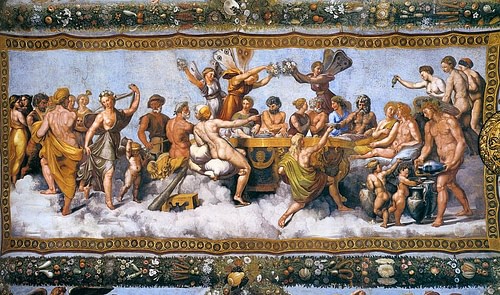
Interpretations & Legacy
The tale of Cupid and Psyche has persisted throughout the centuries, which has naturally given rise to many interpretations. At least as early as the 6th century CE, writers have looked at the story as an allegory about the human soul. The writer Fulgentius, looking at the story from a Christian perspective, compares Psyche to Adam, both of whose sinful curiosities led to banishment from a paradise. Others, such as Giovanni Boccaccio, writing in the 14th century CE, compare the marriage between Psyche and Cupid to the bond between the human soul and God. More recently, the story has been analyzed through different psychological and feminist interpretations.
Thomas Bullfinch, in his Bullfinch's Mythology, relays another allegorical interpretation. He notes that the Greek word for butterfly is psyche, which is also their same word for soul. Bullfinch writes that there is no better illustration of the soul more beautiful than the butterfly, "bursting on brilliant wings from the tomb in which it has lain." Similarly, Bullfinch writes, the human soul is purified through suffering and misfortunes and "is thus prepared for the enjoyment of true and pure happiness" (Bullfinch, 89).
Psyche's legacy is also seen through many different works of art and literature throughout the centuries. Rings bearing the likenesses of Cupid and Psyche have been found dating back to Roman Britain, whilst engraved gems from Britain have also been found depicting Cupid torching a butterfly. These finds could suggest that Cupid and Psyche may have had a religious following.
Since then, the story as well as their marriage has been a popular theme for many artists, ranging from Raphael to Goya and Edvard Munch. In literature, the story can be found alluded to in works by many significant writers and poets. John Milton alludes to the story at the end of his Comus, John Keats references it in his poem Ode to Psyche, and C.S. Lewis's novel Till We Have Faces is a retelling of the story from the perspective of one of Psyche's sisters, to name a few examples.
The story of Psyche is one of a mortal woman who, abandoned by her lover due to her own curiosity, completes many seemingly impossible trials to win him back, becoming a goddess along the way. Just as a butterfly or a human soul endures pain and change, so too does Psyche, as many artists and writers have alluded to throughout the centuries.

